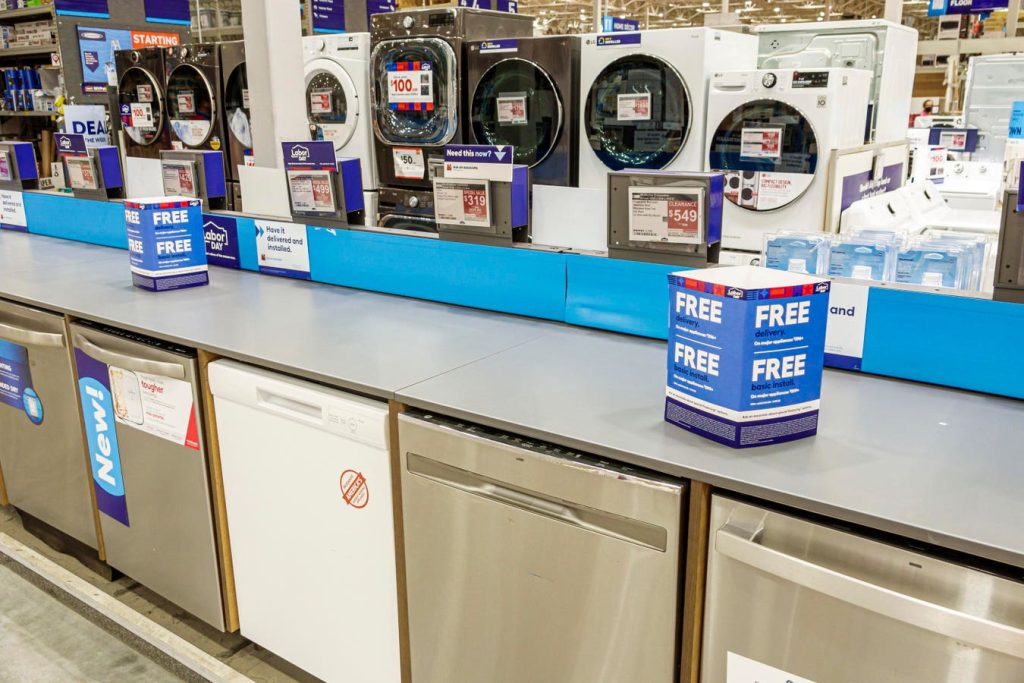Miami Hialeah, Florida, Lowe’s Home Improvement, major appliances department, (Photo by: Jeffrey … [+]
A friend recently asked if she should buy a new dishwasher and laptop now, and perhaps stock up on imported chocolate, in anticipation of President-elect Trump’s threatened double-digit worldwide tariffs. On the same day, another friend asked the same question about a refrigerator.
Trump has promised to lower consumer prices, but two ideas he raises often, mass deportations of immigrants and broad-based tariffs, could result in rapid price increases for many goods. And there already is anecdotal evidence that both consumers and businesses are preparing for the possibility by boosting spending months before Trump’s second term even starts.
A Vicious Cycle
In a sluggish economy, more spending can be good since it drives a large share of growth. But today, panic buying would occur amidst a healthy economy and strong employment. And it could kick off a nasty inflationary spiral where consumers think, “I better buy now because prices are only going to rise.”
Economists fear that reaction would create a vicious cycle: More spending causes shortages in goods, which drives up prices even more, which further accelerates consumption, which creates more empty shelves and ever-higher prices. And once that inflationary fever rises, it is hard to break.
That economy-wide spiral never happened after the pandemic. And it’s one reason why inflation was tamed without a recession that might have been needed to curb spending. It won’t be so easy if a buying frenzy sets in this time.
Tariffs
How could Trump’s economic agenda set off such a spiral? Start with his threatened double-digit tariffs on worldwide imports: They would result in higher costs for US businesses, both for finished products and parts and materials. And those companies will pass most of those costs on to consumers.
At a November 19 Tax Policy Center panel, Brookings Institution economist Wendy Edelberg warned this already may be happening: “If we’re talking about double-digit across-the-board tariffs, if you make a credible threat, you’re going to get a business response long before that tariff is enacted. We’re already starting to see evidence of importers hoarding.” The result, she warns, will be “tangled up supply chains, empty shelves, and price spikes.”
The Wall Street Journal reports that US firms already are starting to stockpile Chinese goods. This not only will give them some flexibility if Trump imposes his threatened tariffs, it also gives firms the opportunity to raise prices and increase margins on the pre-tariff products they have stashed in inventory.
This is exactly what happened in advance of then-President Trump’s well-telegraphed 2018 import taxes on China and other countries. Only this time, Trump threatens far more extensive tariffs on imports from every country in the world.
How Will Consumers Respond?
And, while it is too soon to know for certain how consumers will respond, we already are seeing advice columnists urging households to gobble up imported goods such as computers and appliances.
These products are a small share of the $20 trillion in annual US consumption. In 2023, about $38 billion in household appliances was produced overseas. In 2023, about $450 billion in electronics and electrical machinery came from other countries. And on their own, they are not likely to increase the overall price level very much.
But consumers, unlike economists, may not distinguish between imports and domestic goods once they start buying in anticipation of price hikes. Besides, some US manufacturers may raise their own prices once their foreign competitors do so in response to the tariffs.
Mass Deportations
Then there is Trump’s promise to deport millions of immigrants, many already in the US labor force, and to curb new immigration. That will reduce the supply of workers in many key industries, including health care, agriculture, and construction, and further boost prices.
Take the current housing shortage. Trump blames it on recent immigrants who, he says, boost costs by competing for scarce real estate.
While research suggests that claim is greatly overstated, the real problem is what mass deportations would mean for the supply of housing. Because it is hard to track undocumented workers, analysts don’t know exactly how many immigrants work in construction. But credible estimates suggest both documented and undocumented foreign-born workers may account for as much as 30 percent of construction labor. And in some states it may be as high as 40 percent.
And without them, new construction and renovations will become more expensive.
Will homebuyers try to accelerate purchases before Trump deports many of those doing construction work, thus driving up costs and worsening the housing shortage, at least in the near term?
The economy eventually will adjust. The Federal Reserve may raise interest rates and the dollar may strengthen, stabilizing relative prices. But all that will take time, and if we learned anything from the recent election, it is that US consumers, and voters, have little patience when it comes to higher prices.
For now, watch what happens to business inventories and consumer spending. They may serve as an important warning of price problems ahead.

